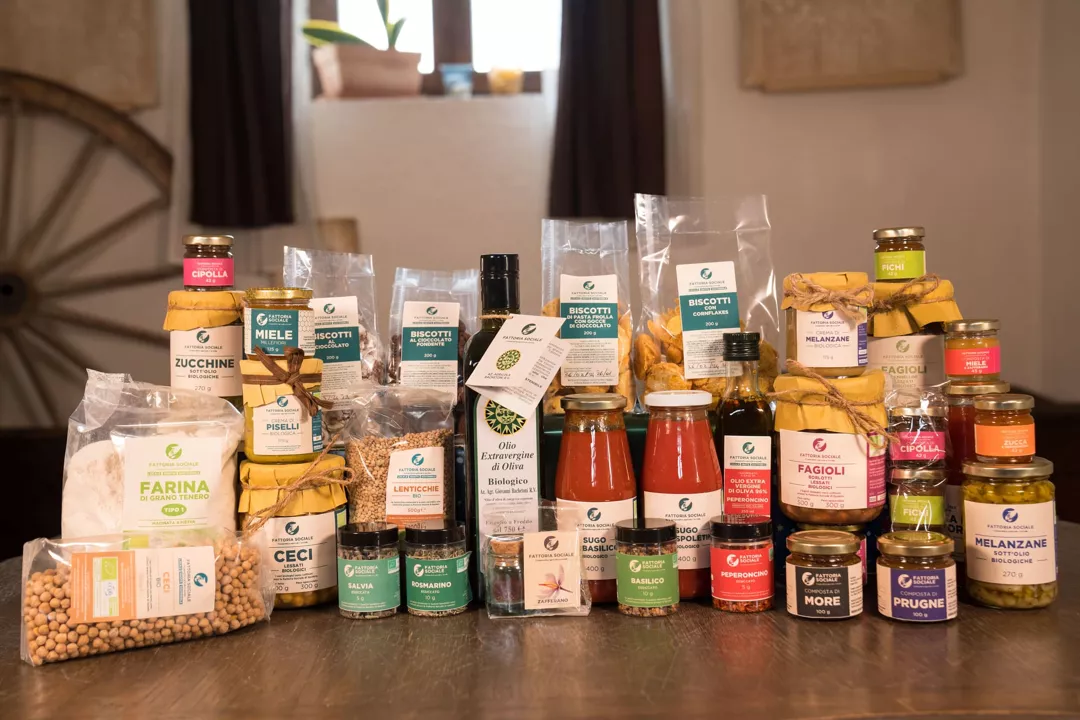General information
RDP Priority
- P2. Competitiveness
RDP Focus Area
- 2A: Farm’s performance, restructuring & modernisation
RDP Measure
- M06: Farm & business development
Beneficiary type
- Producer group / cooperative / farmer’s association
Summary
The Fattoria Sociale di Spoleto social farm used CAP funding to promote the social inclusion of disabled people and refugees in rural areas. Farm and business development support was used for setting up a wine-tasting point and food processing laboratory; onotherapy for rehabilitation; and a control and management centre for online ordering which can be operated by people with autism. In addition, a photovoltaic power system was installed.
Results
- The social farm employed four young people with disabilities on permanent part-time contracts.
- The social farm increased overall revenue within the rural community thanks to the social farm’s increased profits. It also improved the integration of disadvantaged people into the local community.

Promoter
Fattoria Sociale di Spoleto
Funding
Total budget: 168 536 (EUR)
EAFRD: 43 120 (EUR)
National/Regional: 56 880 (EUR)
Private/own: 68 536 (EUR)
Resources
Documents
Good Practice Report - Rural diversification in the social economy: the story of the Fattoria Sociale di Spoleto social farm
(PDF – 1.33 MB)
Context
The Fattoria Sociale di Spoleto social farm is a social cooperative, established in 2013. Its mission is to promote the social inclusion of disadvantaged people and minorities by providing employment and other types of support such as on-the-job training in the agricultural sector. Based in Spoleto, in the Umbria Valley, Fattoria Sociale manages a farm of 8.74 hectares. The farm’s activities include horticulture and olive grove management. There is also plant nursery and a country house.
Since its inception, Fattoria Sociale promotes inclusive rural communities by combining agricultural traditions and innovation in relation to organic food production and processing. The farm also promotes social innovation by including disadvantaged people in its business activities and by investing in the application of new technologies.
Objectives
The main aim of this project was to introduce a sustainable business model that tackles social, economic and environmental challenges: seeking social sustainability through the integration of disadvantaged people into the workforce; environmental sustainability through organic farming and the use of renewable energy; as well as economic sustainability through the development of new business activities within the primary sector, for example by promoting short supply chains in food systems.
Activities
Project activities included:
- Setting up a wine-tasting point to employ disadvantaged people in this complex, technical and social activity. It also provided job training to those who wished to learn about grape growing and the winemaking process. Here, participants learned techniques for training their palate and their memory to detect aromas and flavours. The activity offers the opportunity for participants to improve their social skills through direct contact with the clients of the restaurant.
- Providing donkey therapy (onotherapy) for people with psychophysical disabilities and developmental disorder issues such as autism, or Alzheimer's disease. This sort of activity is not widely available throughout the territory, in particular within public health facilities, so in this context the social farm provides an innovative and valuable service.
- Setting up a laboratory for food processing to improve the working skills of participants and enable them to participate in short supply chains in agriculture. Participants learn how to cultivate cereals and legumes, and how to produce nursery plants. They are also involved in food processing, selling and the wine-tasting activities. The food processing laboratory employs disadvantaged people, enabling them to create their own products, e.g. jam.
- Setting up a control and management centre for online ordering. The centre uses a specific software application for direct sales which can be operated by people with autism. The software uses an input interface for data entry concerning products included in the catalogue; their quantity; price; collection method, etc.
- Installing a photovoltaic power system which produces 15.4 kW of power.
Main results
- The social farm has employed four young people with disabilities on permanent part-time contracts of seven hours per week.
- The social farm increased the overall revenue within the rural community thanks to the social farm’s increased profits. It has also improved local networking and the integration of disadvantaged people.
- Climate and environmental benefits were achieved through the installation of a photovoltaic power system, and through organic farming.
- A new sustainable business model was introduced that is geared towards social, economic and environmental sustainability.
- The project promoted short supply chains in agriculture as the social farm now produces, processes and sells its products locally.
- The social farm promoted digitalisation in farming and improved the skills of minorities in rural areas.
Key lessons
- The project demonstrated that a socially, economically and environmentally sustainable business model is possible. Farming can foster social inclusion and promote the added value of organic food for the health of the planet and society.
- Short supply chains in agricultural food systems can make a significant contribution to ensuring that rural businesses are aware of, and actively contribute to, the socio-economic fabric of rural areas.
No-one is left behind; we advance inclusion through farming.
